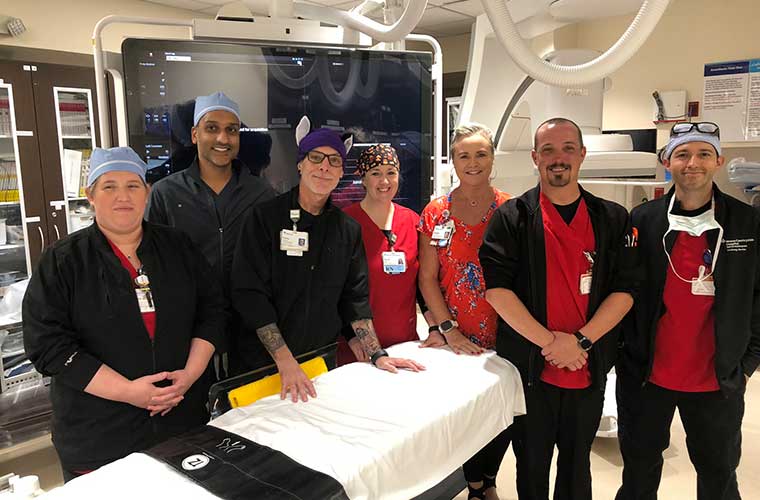Renal Denervation Gives Hope to Patients With High Blood Pressure

Ruth Rettig had never been diagnosed with high blood pressure, but about a year ago that changed. Drastically. Out of the blue, she said, her blood pressure skyrocketed and, try as she might, through various medications, changes in diet and lifestyle, she could not get it under control.
She was well aware that high blood pressure can have dire consequences such as stroke, heart attack and heart failure. It was concerning, and she was scared. Then, she heard about a new treatment option called renal denervation (RDN) being offered at BayCare, and her hopes soared.
The procedure targets nerves near the kidneys that can become overactive and cause elevated blood pressure. Rettig had this procedure Tuesday at BayCare’s Mease Countryside Hospital, performed by BayCare Medical Group Interventional Cardiologist Parag Patel, MD. She is the first patient in BayCare to receive this treatment outside of a clinical trial.
“Ruth was the perfect type of patient for this procedure,’’ Dr. Patel said. “She has resistant hypertension, and it’s pretty severe. RDN is an option when medications and lifestyle changes don’t effectively control hypertension.’’
During the minimally invasive procedure, the doctor inserts a very thin tube into the renal arteries and applies thermal energy to disrupt the nerves. The tube is removed, leaving no implant behind. The patient is under mild sedation during the procedure and is expected to go home on the same day.
“It was an easy decision to have the procedure,’’ said Rettig, who is 70. “The way it had been, you worry what might happen next. I’m hopeful now. I’m excited and grateful that I had this option.’’
Blood pressure is considered high if it’s more than 130 (systolic) over 80 (diastolic) in adults. At Rettig’s highest, her systolic blood pressure was 190. Combinations of medications brought it down to the 140-160 range, still of great concern. The reduction in blood pressure after renal denervation varies by patient, but Dr. Patel said even modest drops can have beneficial clinical effect.
Generally, after about a month, patients should know the result of the RDN procedure. Trials have shown a durable and sustained response. Like all patients, Rettig will need to continue to take medication, but the difference is now her blood pressure will be better controlled whereas before, even with medications, it was uncontrolled.
“The thing about blood pressure is there’s not one single cause; it’s a complex condition,’’ Dr. Patel said. “There’s no miracle cure. Renal denervation is another tool or option for people with difficult blood pressure to control despite lifestyle modification and medications.’’
According to the Centers for Disease Control and Prevention, nearly half of all adults in the United States have high blood pressure and only about one in four have it under control.
The prevalence of the condition makes this innovative solution all the more compelling.
“As a cardiologist, it’s very exciting,’’ Dr. Patel said. “We see firsthand the effects of uncontrolled blood pressure – the heart attacks, the heart failure and strokes. From a larger population perspective, if we can achieve better blood pressure control in our community, we can have a massive impact in reducing cardiovascular disease. We are proud to be offering this new treatment option to the people of Tampa Bay.”
As participants of the RDN clinical trials, the heart and vascular teams at Mease Countryside and Morton Plant hospitals are experienced and offering this treatment to patients. It is expected the procedure will also become available at St. Joseph’s Hospital in Tampa and Winter Haven Hospital.
For more information, visit these pages on baycare.org:
